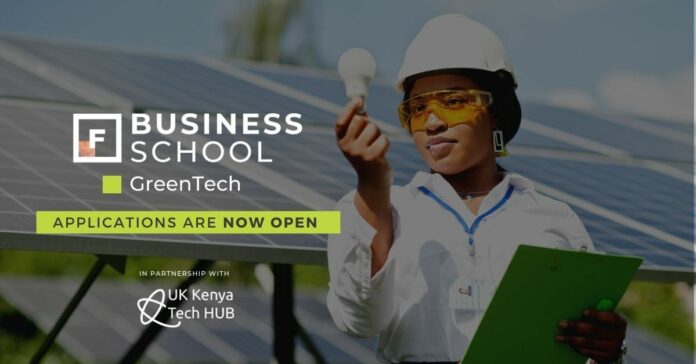The UK-Kenya Tech Hub Supports 30 Kenyan Female GreenTech Entrepreneurs
As the world looks to manage its way out of the COVID-crisis, which has affected millions of lives and decimated economies, it is important to remember that we are still tackling an even greater crisis – climate change. We also have an opportunity now to drive clean, resilient and inclusive recoveries – shaping the low carbon economy of the future that will create new jobs, attract green investment and protecting the global environment for future generations.
As the host of the 2021 UN Climate Change summit, the UK is working hard in advance of COP 26 to increase the level of global ambition necessary t+o provide confidence that we are on track to limit global warming to below 2 degrees.
The UK, as a bilateral partner, is committed to supporting Kenya in delivering an accelerated and just transition, not only to meet the climate imperative, but to ensure the country is at the forefront of the global economic shift. This support, like the transition itself, is at all levels; from £200 million flowing into major clean technology programmes through International Climate Finance to entrepreneurs, designing and developing small and micro-enterprise sustainable companies of the future.
Future Females is therefore excited to announce that the Future Females Business School, in partnership with UK-Kenya Tech Hub, will be launching a new programme focusing on GreenTech, supporting 30 Kenyan female founders through the Business School GreenTech programme.
Seeing the positive impact that the Future Females Business School, together with the UK-Kenya Tech Hub, has had with its pilot cohort that recently graduated, it is important to build on this momentum and increase the scope further to support female entrepreneurs who are working to care for and protect our planet. This led to the introduction of the Future Females Business School GreenTech programme.
UK-Kenya Tech Hub Director, Sheena Raikundalia said:
“Entrepreneurs have already shown how their innovations can be used to solve development challenges such as access to financial services, health-care, food, education. With this GreenTech programme, we want to find and support leading female entrepreneurs, developing local solutions addressing one the biggest crisis facing us globally, climate change.”
British High Commissioner Kenya, Jane Marriott added:
“Technology is at the heart of the UK- Kenya Strategic Partnership. We’re proud to support 30 female Kenyan founders to grow green businesses – these fantastic women will be the future of their communities and Kenya, building the world of the future.”
Commenting on the GreenTech programme launch, Future Females Co-Founder, Cerina Bezuidenhout said:
“At Future Females, we have always been passionate about supporting sustainable businesses, and we are very excited to be focusing on GreenTech businesses in our partnership with UK-Kenya Tech Hub. The entrepreneurs who participate in our programmes are not just building businesses – they’re creating innovative solutions to real problems we’re facing in this ‘new’ world, and act as a source of hope for their communities – and we can’t wait to meet them.”

About the program
1. Who is Future Females?
Future Females is a movement that exists to increase the number of and better support the success of female entrepreneurs. Future Females has shown immense growth since its conception in August 2017 in Cape Town, currently boasting a presence in 36 locations worldwide, hosting regular events for their engaged community of over 80,000 members, and offering the Future Females Business School online training programme.
2. Who is this programme for?
This programme is for Kenyan female entrepreneurs with early-stage businesses that aim at protecting the environment and conserving natural resources using alternative technologies that are less harmful to the environment.
Examples of these businesses include:
● Generation of power through renewable energy technology
● Waste management collection (collection, recycling, reuse/repurpose)
● Water management (harvesting, filtering/treatment and metering)
● Farmer’s markets
● Organic produce & retail
● Green blogs
● Eco-friendly fashion
● Eco-friendly beauty or cleaning products
● Upcycling furniture
● Green app development
● Used bookstore
● Integrative medicine (Herbal/plant-based remedy)
● Food plant nursery and such other industries.
The programme targets founders who are already working on GreenTech solutions and are ready to upskill and utilise technology to sustainably grow their businesses and create impact.
3. What’s included in the programme?
● The three-month virtual programme covers 10 actionable modules that take entrepreneurs through the fundamental building blocks of starting and growing a GreenTech business.
● Throughout the duration of the programme, entrepreneurs will have access to weekly coaching sessions with a sustainability coach and guest feature masterclasses with industry experts; to increase the capacity of their enterprises to scale and become more sustainable.
4. Who is UK-Kenya Tech Hub?
The UK-Kenya Tech Hub forms part of the International Tech Hub network delivered by DCMS (Department for Digital, Culture, Media & Sport), under the Digital Access Programme – a UK government initiative designed to build inclusive prosperity through capitalising on digital services and opportunities in partner countries.
5. How to apply
Applications for the Future Females Business School GreenTech programme, in partnership with the UK-Kenya Tech Hub are open now! If you are a Kenyan based female entrepreneur with a GreenTech business idea /or early-stage startup and are passionate about making a social impact –
Applications are open until 22 February 2021, with only 30 spots available for the pilot programme commencing on the 8 March 2021.








